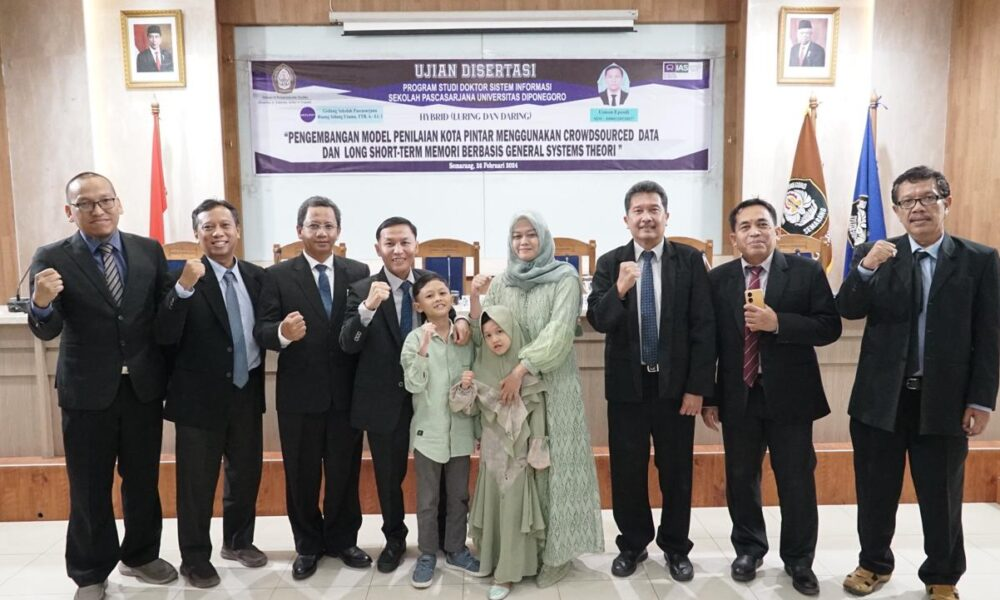Received the Cumlaude Predicate, Usman Ependi,
First Graduate of Undip’s Doctor of Information Systems
SEMARANG Bina Darma University Palembang lecturer Usman Ependi received a doctorate degree after defending his dissertation on the Information Systems Doctoral Study Program (DSI) Dissertation exam at the Diponegoro University (Undip) Postgraduate School and received a cum laude title with a GPA of 4.00 on Monday, February 26 2024 at the TTB A Building, Undip Postgraduate School.
Dr Usman Ependi conducted research with the title “Development of a Smart City Assessment Model Using Crowdsourced Data and Long Short-Term Memory Based on General Systems Theory”.
Betindak as Chair of Examiners and Dean of the Undip Graduate School, Dr. RB. Sularto, SH, M.Hum., Examining Secretary and Chair of the Undip Information Systems Doctoral Study Program Prof. Dr. Drs. Rahmat Gernowo, M.Si. As for acting as Promoter Prof. Dr. Adian Fatchur Rochim, ST, MT and Ko Promoter Dr.Eng. Adi Wibowo, S.Si., M.Kom.
Examiner I Prof. Dr. Ir. Hadiyanto, ST, M.Sc., IPU, Examiner II Prof. Dr. Ir. R. Rizal Isnanto, ST, MM, MT, IPM and external examiner from ITB Prof. Dr. Ing. Ir. Suhardi, MT.
According to Dr Usman Ependi, in order to achieve a deeper understanding of urban ecosystems through smart city assessments, there are significant limitations in traditional evaluation techniques. Such limitations include data sources that are not always appropriate, lack of comprehensive data, and real-time constraints.
“Significant developments in the availability of crowdsourced data have provided a valuable dynamic picture of urban systems. Awareness of the importance of this data prompted this research to develop a smart city assessment model using crowdsourced data, the main goal of which is to overcome gaps in understanding urban interactions, while simultaneously addressing the challenges of unbalanced data originating from crowdsourced data,” said Dr Usman Ependi.
He added that this research adopts model development based on General Systems Theory (GST) principles for smart cities with an approach through Design Science Methodology. Additionally, unbalanced data handling is emphasized by the use of data-level hybrids that combine oversampling and undersampling, which include Random Over Sampling and Neighborhood Cleaning Rule (ROS-NCL) with long short-term memory (LSTM) classification algorithms.
The result of this research is a comprehensive smart city assessment model. This model provides a deep understanding of urban ecosystems through the three main dimensions of sustainability: social, economic, and environmental. The model also includes twelve indicators relevant to these dimensions. The validity and effectiveness of this model have been tested empirically through case studies in four cities on the Indonesian island of Java, namely Surabaya, Semarang, Bandung and Jakarta. The assessment results of this model are presented through multidimensional analysis, providing an in-depth view of each city that can be used to guide future development and improvement. In addition, the ROS-NCL approach and the LSTM algorithm proved to be very effective in addressing data imbalances in data crowdsourced classification to smart city assessment dimensions and indicators, demonstrating their superiority compared to other approaches in data level hybrids.

